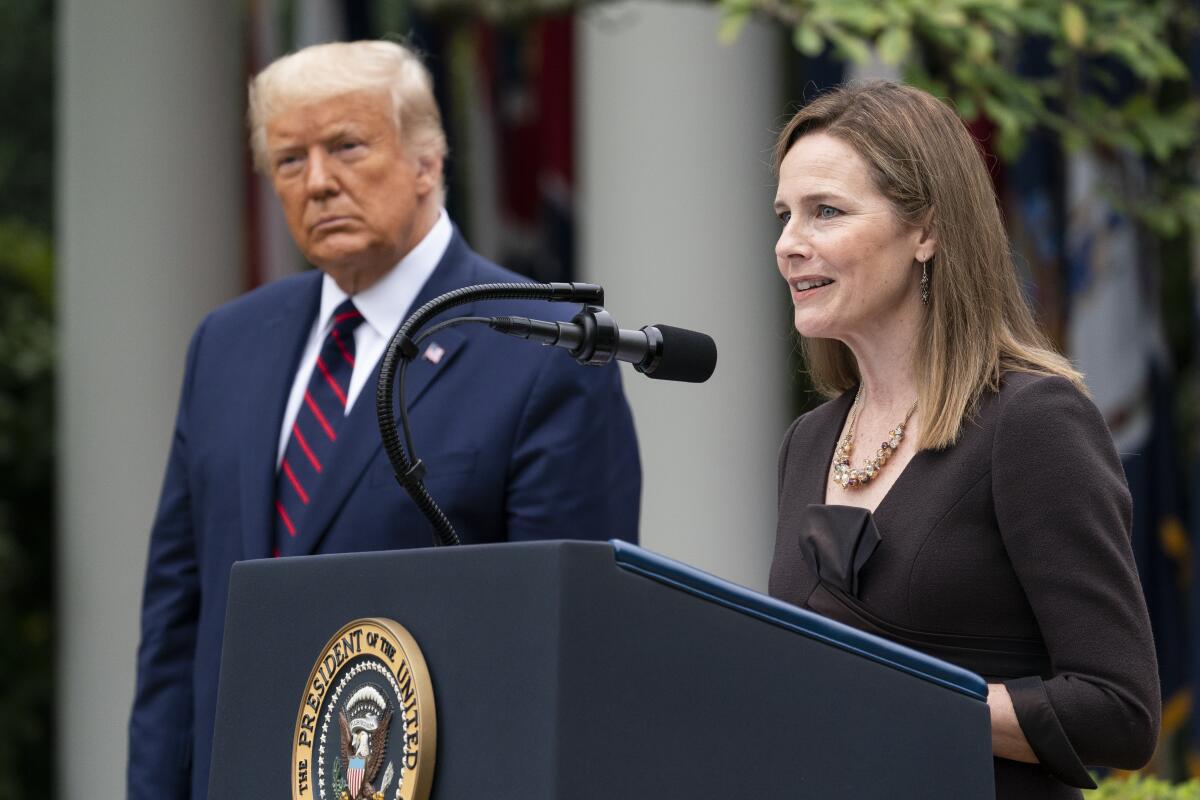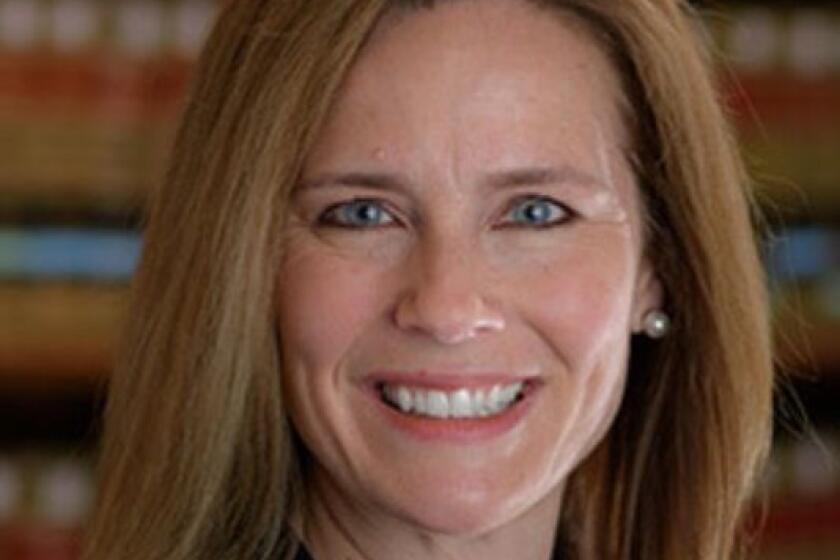Trump Supreme Court pick already ruled on pending Obamacare case — in a moot exercise

Judge Amy Coney Barrett, President Trump’s nominee to the Supreme Court, has already weighed in on one of the most significant and controversial cases it is scheduled to consider this fall — albeit in a mock exercise.
And, contrary to what many Democrats fear, her position on the moot court that considered the Affordable Care Act, also known as Obamacare, went mostly against the Trump administration’s stance.
One week after the election, the Supreme Court is scheduled to hear a case in which Republican officials of Texas and a coalition of other conservative states have asked the justices to strike down the entire law. The Trump administration has joined them. California Atty. Gen. Xavier Becerra, joined by officials of a number of Democratic-led states, is defending the law.
Just one week before the death of Justice Ruth Bader Ginsburg, whom she has been nominated to replace, Barrett participated in a mock court hearing on the pending case. She was part of an eight-judge panel that heard the mock arguments, conducted at William & Mary Law School.
None of the judges ruled in favor of the administration and Republican states’ request to strike down the law.
Five of the judges ruled that one part of the law — the so-called individual mandate, which Congress has already effectively nullified — was unconstitutional, but that the rest of the healthcare law could stay in place. The other three judges would have thrown out the case, arguing that the conservative states challenging the law did not have standing to bring the suit.
The circuit judge would cement a 6-3 conservative majority on the Supreme Court — one that might very well overturn Roe vs. Wade.
It’s not known which side Barrett was on because the participants’ votes were not revealed, according to a person who viewed the session and declined to be identified.
What is known is that she previously had been publicly critical of the Supreme Court’s 2012 opinion, written by Chief Justice John G. Roberts Jr., that first upheld the act. The chief justice “pushed the Affordable Care Act beyond its plausible meaning to save the statute,” she wrote in a 2017 essay. Barrett hasn’t publicly commented on the current case.
Moot courts are meant to be educational role-playing exercises; few who engage in such sessions would suggest that Barrett’s vote telegraphed how she would vote in the actual case. William & Mary law professor Allison Orr Larsen told attendees, “You should not take the questions we ask or the arguments we make as personal endorsements,” according to a post on the school’s website.
Still, the event provides a clue of how President Trump’s third nominee to the Supreme Court might rule on one of the most significant cases of the year.
The timing of the mock session was coincidental — coming just before Ginsburg’s death would propel Barrett in line for a high court seat. Barrett almost certainly would not have participated in a mock court session on a pending Supreme Court case if she had had any idea she might be on the bench to help decide it.
Democrats have made the healthcare case a key part of both their 2020 election strategy and their opposition to Barrett’s nomination. Just this week, Democrats began airing a campaign advertisement in Florida warning that Trump wants to get a Supreme Court justice confirmed before the election in order to have a vote to strike down the healthcare law.
Amy Coney Barrett, President Trump’s nominee to fill Ruth Bader Ginsburg’s seat on the Supreme Court, is a hero to many judicial conservatives.
The challenge before the Supreme Court is the latest attempt by opponents of the law to get it thrown out. Twice before, the high court has upheld the law’s core components.
If the justices were to agree with the administration and Republican states, millions of Americans could lose their health insurance. And gone would be one of the law’s most popular provisions, its requirement that insurance companies provide coverage to people with preexisting medical conditions, with policies and premiums comparable to what other customers have.
The first time the Supreme Court upheld the healthcare law, Roberts’ opinion said Congress had the authority to require that people either purchase insurance or pay a fine because the financial penalty could be considered a tax. In 2017, as part of the Trump tax cut law, Congress cut the penalty for not having insurance to $0, effectively eliminating the mandate.
That opened the door to the current legal challenge. Shortly after the tax law was signed, Texas and other Republican-led states filed suit, charging that because the penalty was now zero, it could no longer be considered a tax. And because the mandate and its penalty were a central part of the healthcare law, if they were invalidated, the entire law would have to be struck down.
A federal district judge in Texas agreed in late 2018. Late in 2019, the U.S. 5th Circuit Court of Appeals issued an inconclusive 2-1 opinion that sent the case back to the district court. In March, the Supreme Court agreed to hear the case.
During the mock session, Barrett asked skeptical questions about whether the government’s taxing authority still justified keeping the individual mandate. According to the recollections of the person who viewed the session, she asked several questions about its constitutionality.
Barrett disclosed her participation in the mock court in a recent filing with the Senate Judiciary Committee, in a questionnaire required of judicial nominees, but she did not provide a video link or any other notes.
Democrats are all but certain to raise the issue in her confirmation hearing, which is tentatively scheduled for mid-October. In a recent floor speech, Sen. Christopher S. Murphy (D-Conn.) complained that Republicans renewed their effort to kill Obamacare in the courts after they failed in 2017 to repeal the law in Congress, and that they ultimately are counting on Trump’s appointees on the Supreme Court to support them.
“The president started by putting Neil Gorsuch on the court, continued with Brett Kavanaugh, and now, one vote away from being able to overturn the Affordable Care Act, he now has a chance with the nomination of Amy Coney Barrett, to finally get what he couldn’t get done in the elected branch of American government: the full repeal and elimination of the Affordable Care Act with nothing to replace it,” Murphy said.
More to Read
Get the L.A. Times Politics newsletter
Deeply reported insights into legislation, politics and policy from Sacramento, Washington and beyond. In your inbox three times per week.
You may occasionally receive promotional content from the Los Angeles Times.








